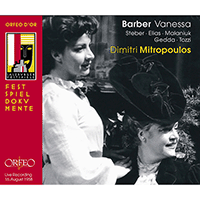Eleanor Steber
Steber grew up in a musical family: her mother, an expert amateur singer, taught her to sing and to play the piano, took her to concerts and encouraged her to sing both in school and in local public performances. She entered the New England Conservatory, Boston intending to major in piano; but her voice teacher, William Whitney, who gave her both a very strong technique and great musical curiosity, encouraged her to concentrate upon singing instead. Although she did not graduate until 1938, she made her operatic stage debut in 1936 as Senta / Der fliegende Holländer with the Commonwealth Opera in Boston and continued her studies during 1939 in New York with Paul Althouse, whom she greatly admired.
During the spring of 1940 Steber won the Metropolitan Opera ‘Auditions of the Air’, which offered a contract with the company. Erich Leinsdorf suggested that she make her debut as Sophie / Der Rosenkavalier, in December 1940. After continuing with small parts such as the Woodbird / Siegfried, Woglinde / Siegfried and Götterdämmerung and a Flower Maiden / Parsifal, Bruno Walter heard her sing Mozart in a hotel concert: he cast her as the First Lady / Die Zauberflöte (1941) and then the Countess / Le nozze di Figaro (1942), after which Steber was clearly established as a leading member of the Met company – while simultaneously also in demand on radio, which paid extremely well.
As a result of her training with Whitney, Steber was able to learn scores quickly and she became a singer with a large repertoire to whom the management would often turn in a crisis. Her roles at the Met, her artistic home, were extremely varied. Not only was she a fine Mozartean, singing Fiordiligi / Così fan tutte, Donna Elvira and Donna Anna / Don Giovanni, and Konstanze in the house’s first performance in 1946 of Die Entführung aus dem Serail, she was excellent in Verdi (Violetta / La traviata, Alice / Falstaff and Desdemona / Otello) and in Puccini (title roles in Madama Butterfly, Tosca and Manon Lescaut, Mimì / La Bohème and Minnie / La fanciulla del West), as well as in Wagner (Elsa / Lohengrin and Eva / Die Meistersinger von Nürnberg) and Richard Strauss (the Marschallin / Der Rosenkavalier) – not forgetting the French repertoire (Marguerite / Faust). So reliable was she that on one memorable occasion she sang Desdemona at a matinée followed by Fiordiligi in the evening.
Although it has been said that relations between Steber and the Met cooled slightly following the appointment of Rudolf Bing as general manager, he gave her the title part in the company’s first production of Arabella, conducted by Rudolf Kempe in 1955 and turned to her to sing the title part in the new production of Barber’s Vanessa in 1958, replacing Sena Jurinac who cancelled at six weeks’ notice; this production was subsequently seen at the Salzburg Festival. The following year Steber sang Marie in the Met’s first production of Wozzeck, with Karl Böhm at the helm. Although she stood in as Minnie in 1966, her final contracted appearance at the Met was as Donna Anna in 1962, with Maazel conducting.
Outside New York Steber did not sing widely in opera in America: she appeared with the San Francisco Opera for only a single season (Micaëla / Carmen and Donna Elvira) and sang Butterfly with Ormandy conducting at the Hollywood Bowl in 1948. She did however give concerts throughout the USA.
In Europe Steber made a number of successful appearances, singing the Countess with the Glyndebourne Festival Opera at the Edinburgh Festival in 1947, Elsa at the Bayreuth Festival in 1953 (the year also of her debuts at the Bavarian State Opera, Munich in Die Frau ohne Schatten under Böhm and at the Vienna State Opera) and Minnie at the Maggio Musicale, Florence, in 1954.
A notable concert and recital singer, Steber commissioned and recorded one of Samuel Barber’s finest works: Knoxville, Summer of 1915. Together with her second husband she founded her own record label, STAND Records. After leaving the Met she taught extensively, as head of the voice department at the Cleveland Institute of Music (1962–1973) and from 1971 at the Juilliard School and the New England Conservatory. She established a foundation to assist young singers in 1975.
Frequently unjustly under-rated (as she felt herself to be by Bing), Steber possessed a rich yet flexible voice and was able to sing to great effect an unusually wide range of major roles, as may be heard in her many official and unofficial recordings.
© Naxos Rights International Ltd. — David Patmore (A–Z of Singers, Naxos 8.558097-100).

















